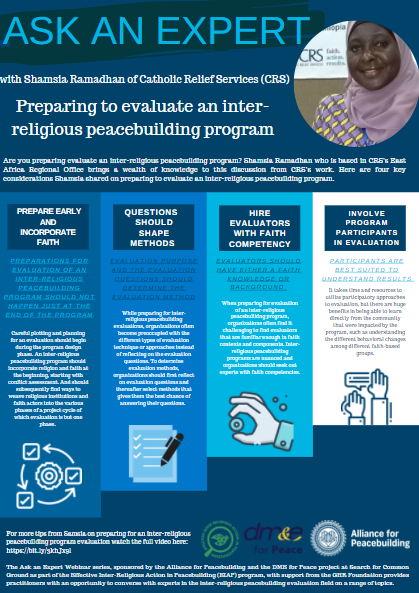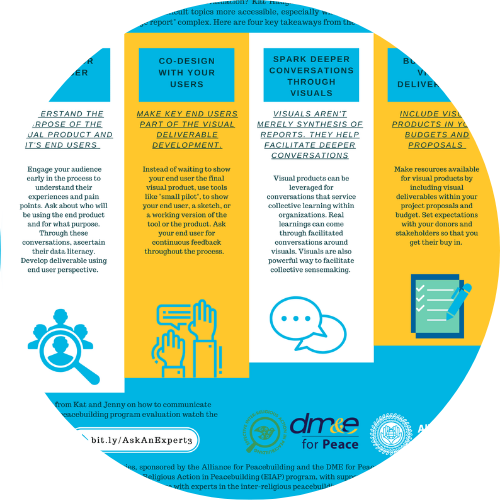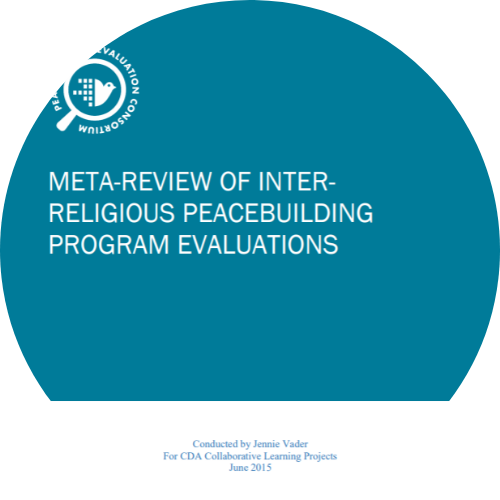Leading the field to embrace an evidence-based approach to develop more effective inter-religious action
AfP is continuing our work on the Effective Inter-religious Action in Peacebuilding Program (EIAP II).
This ground-breaking initiative seeks to foster an evidence-based approach to develop more effective inter-religious action as an important contributor to the peacebuilding and development sectors.
The EIAP II program is focused on two main areas to achieve this critical culture shift in the inter-religious sector.
Improving DM&E Capacity
AfP is working with organizations to enhance their skills to effectively design, monitor, and evaluate their programs through our Inter-Religious Peacebuilding Design and Monitoring (PDM) Training and Peer Learning Community.
Host a PDM Training Today
If you are interested in contracting AfP to conduct a PDM Training with your organization, please review our training flyer and proposed agenda.
For more information, please reach out to Jessica Baumgardner-Zuzik, AfP’s Senior Director for Learning & Evaluation.
Building Connections
Creating opportunities and space to build partnerships between faith based and secular peacebuilding programs, organizations, evaluators, and researchers to improve collaboration and push us towards greater evidence-based programming in the inter-religious action sector through convenings like the Insight Forum in Nairobi, Kenya.
ask an expert webinar series
As part of the Effective Action in Interreligious Peacebuilding (EAIP) program, Alliance for Peacebuilding and DME for Peace project at Search for Common Ground hosted an exclusive webinar series with the support from the GHR Foundation. This webinar series was an opportunity to converse with experts in the field of inter-religious peacebuilding evaluation on a range of topics.
Ask an Expert 1: Preparing to evaluate an interreligious peacebuilding program
Shamsia Ramadhan of Catholic Relief Services (CRS) joined us for the first session of the Ask an Expert webinar series, to discuss how to effectively prepare to evaluate an interreligious peacebuilding program. Shamsia is based in CRS’s East Africa Regional Office and brought a wealth of knowledge to this discussion from CRS’s work. This session focused on key considerations when preparing to evaluate an interreligious peacebuilding program and what makes it different from traditional programming.
Ask an Expert 2: Adapting your peacebuilding programs for maximum impact
Ask an Expert 2: Adapting your peacebuilding programs for maximum impact
Rebecca Herrington, CEO and Director of Strategic Learning at Headlight Consulting Services, joined us for the second session of the Ask an Expert webinar series, to discuss how to adapt peacebuilding program to ensure maximum efficiency and effectiveness. Over the last 13 years, Rebecca has helped organizations develop understanding of their programming and helped them adapt to changing dynamics and data. The session explored topics like, how to use data and evidence to inform decision making and program adaptation, how to adjust monitoring and evaluation plans to be more use-focused and how to leverage a systems lens to solve complex problems.
Ask an Expert 3: Communicating the results of your work
Ask an Expert 3: Communicating the results of your work
Kat Haugh, Senior Advisor on Organizational Learning at the Global Knowledge Initiative and Jenny Nulty of Pivot Data Design, joined us for the third session of the Ask an Expert webinar series, on how to effectively communicate the results of your programming. This session focused on how to integrate visual thinking into data collection, analysis, and reporting. Participants learned about new ways to effectively communicate results, how to make dense and difficult topics more accessible, especially when working cross-culturally, and how to move beyond the traditional "70 page report" complex.
Effective Inter-Religious Action iN peacebuilding (EIAP I) Program
The EIAP I Program was a three-year collaborative effort aimed at supporting inter-religious action in realizing its potential as a force for sustainable peace. It aims to foster cooperative exchanges among religious peacebuilders, evaluators, donors, and policymakers on how to evaluate inter-religious action in peacebuilding contexts.
The EIAP I Program started a rich and respectful conversation between secular and religious peacebuilders that strengthened the ability of religious peacebuilders to measure impact and helped evaluation experts expand their understanding of how to measure success in this area.
“[T[hese accomplishments are all the more impressive since EIAP broke new ground in the peacebuilding field. Peacebuilders have thought, talked, and written about religion and conflict for many years. They have long recognized what a powerful force religious action can be for peace. But it is rare that the debate about religion and peacebuilding has ever reached this deeply into practice and concrete action.”
“[T]his foundation in practical action – in concrete efforts to strengthen inter-religious peacebuilding, build a strong body of evidence, and prove its value – is what makes the grant exceptional. And what represents its greatest potential moving forward.”
The EIAP I program was driven by the core belief that inter-religious action plays an important role in both religious and secular peacebuilding programs to build resilient, peaceful societies. The overall goal was to foster more effective inter-religious action, as an important contributor to broader peacebuilding and development processes, by developing a framework for ongoing learning, establishing a nascent community of practice, developing guidance on how to evaluate inter-religious action, and advocating for policies that support inter-religious action in peacebuilding.
Funders
Inter-Religious Research
Featured PResentations
JLI MEAL Learning Hub AfP Inter-Religious Presentation.
Rev. Gary Mason on Building Peace and the Power of Memory
Beyond a Leap of Faith @PeaceCon2017
M&E Thursday Talk - What is Effective Inter-Religious Peacebuilding?
M&E Thursday Talk - Why Effective Inter-religious Action in Peacebuilding Matters
M&E Thursday Talk - Faith Matters: How to Design, Monitor & Evaluation Inter-Religious Peacebuilding























